About
"You'll never find peace of mind without A.P.E."
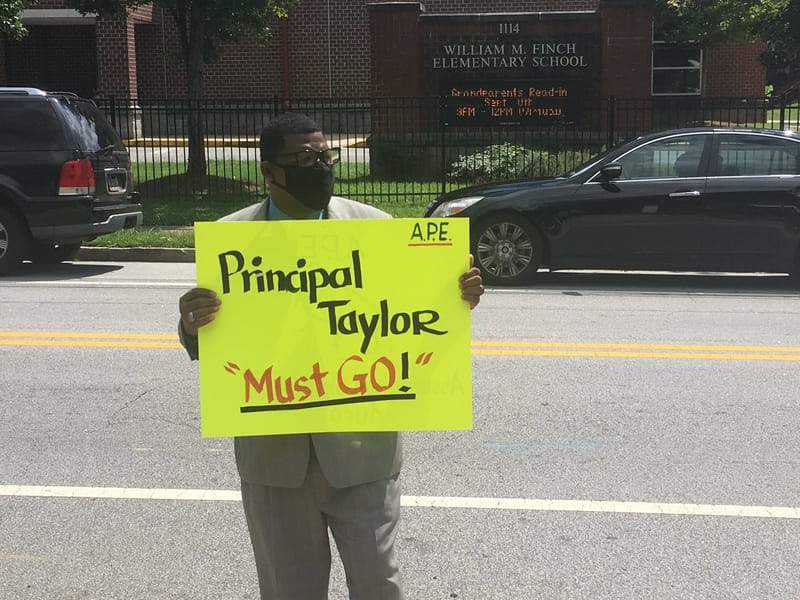
A.P.E. is Now Nationwide!
A.P.E. is the most proactive teachers’ association in the South. We never leave a member behind and always stand by our teachers instead of siding with administrators, unlike some unions. A.P.E. recognizes the challenges teachers face today, often being mistreated by school administrators. When you join A.P.E., you can rest assured that your voice will be heard, and you will never be left behind.
We are committed to fighting against what we term “bad drive-by evaluations.” These evaluations are often conducted by lazy administrators who misuse their power to undermine teachers’ careers. They enter classrooms unannounced, evaluate teachers outside of scheduled times, and unjustly score them low in communication, despite their own inability to communicate effectively. This subjective assessment is primarily used because it allows administrators to manipulate evaluations to their advantage. They often wait until the end-of-year summative review to mark teachers negatively, which can have serious repercussions. If a teacher receives two adverse summative reports within five years, the Georgia Professional Standards Commission (PSC) may suspend their certificate, making it nearly impossible to secure another teaching position without a valid certificate to remediate deficiencies.
The A.P.E. teachers’ union understands that many educators waste money on ineffective associations in Georgia that fail to protect their rights. In contrast, A.P.E. is dedicated to holding administrators accountable for any abuse of power against our members. We are proud to be the most aggressive teachers’ union in Georgia. If I were a teacher in this state, I would proudly be a member of A.P.E. We have saved countless teachers’ careers, and I lost count long ago. I founded this union because I know teachers are fed up with being mistreated and are seeking a strong advocate to fight back against abuse and ensure they receive the respect and support they deserve. From the beginning, we knew A.P.E. would be unstoppable because we committed to fiercely defending our members against any administrator who threatened them.
Why You Don’t Need Liability Insurance: Is It a Scam in Georgia?
When I first began representing classroom teachers, my mentor, Dr. John Trotter, educated me on the myth of liability insurance. He explained that the State of Georgia provides robust sovereign immunity protection for teachers. This means that the State and its agents, including teachers, cannot be held liable for negligence, as outlined in the Georgia Constitution (Article I, Section II, Paragraph IX) and statutory law (O.C.G.A. 20-2-992 and 20-2-993). Moreover, O.C.G.A. 20-2-1000, enacted in 1995, mandates local school boards to provide legal representation for teachers if they face lawsuits related to disciplinary actions, and it specifies that parents must cover all reasonable court costs.
Organizations like GAE, AFT, and PAGE continue to promote the need for liability insurance. Why? In my opinion, they see it as a profitable scheme.
I have chosen not to perpetuate this myth surrounding liability insurance.
Norreese L. Haynes, BSBM, MSA
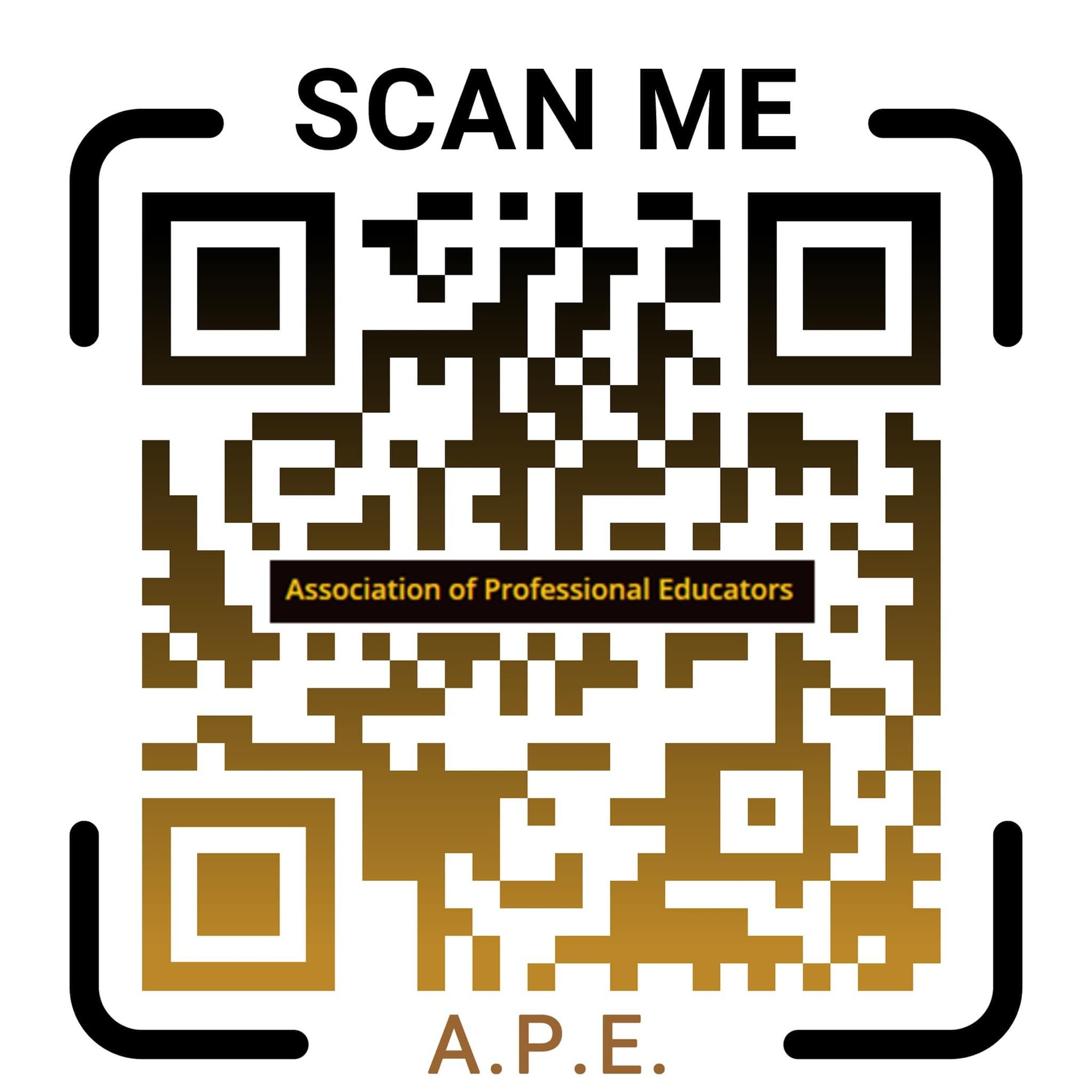 Scan or click the QR code above to sign up for membership today!
Scan or click the QR code above to sign up for membership today!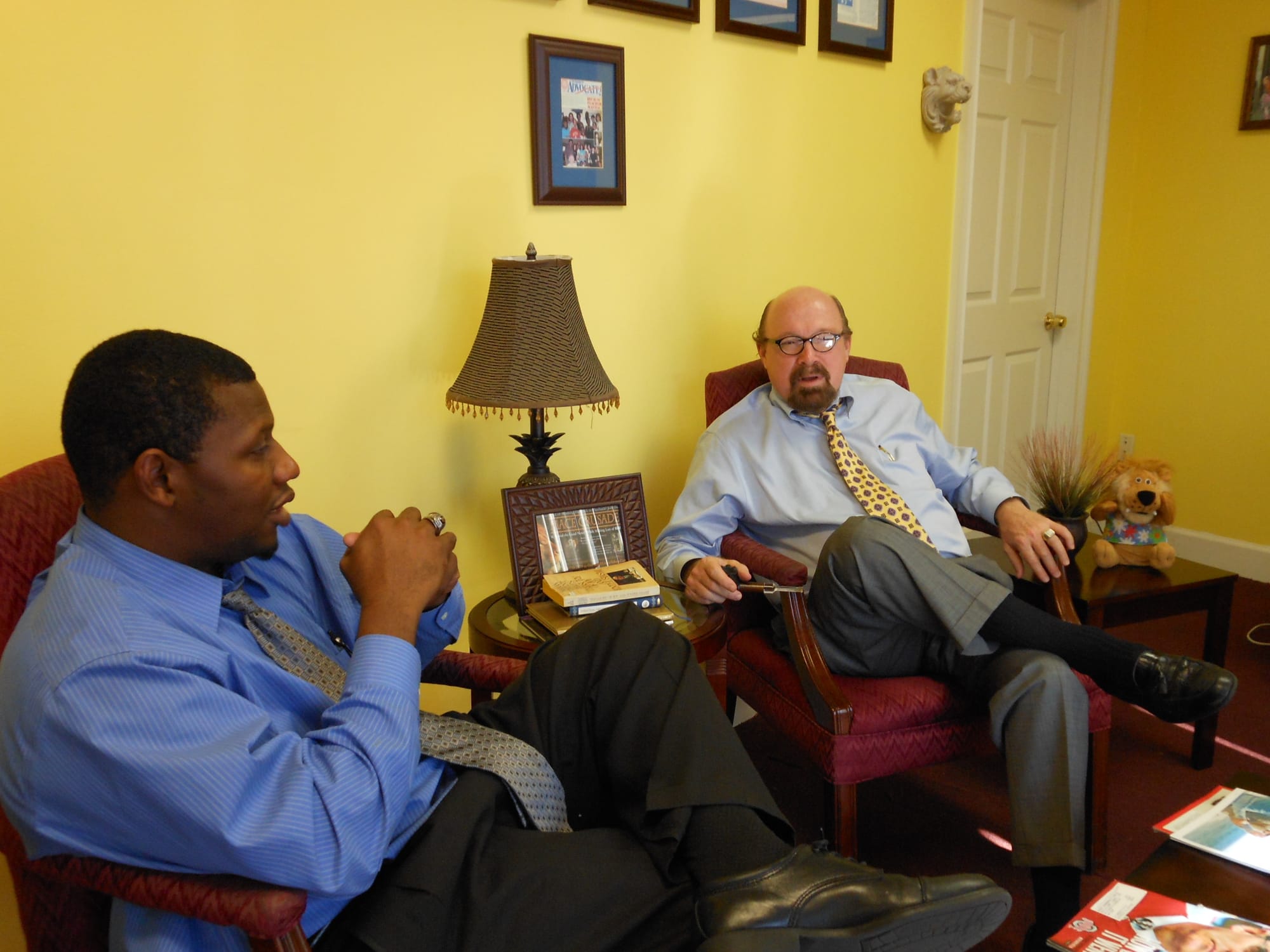
American Public Education has been getting worse and worse as the years pass.
The American Public Education system has been deteriorating over the years, and the so-called school “reformers,” including the billionaires who have suddenly taken an undue interest in public education, seem to lack not only the answers but even the right questions to ask. Their proposed “solutions” are as ineffective as teats on a boar, and rather than improving the situation, they risk exacerbating existing problems, potentially driving public education further into decline—perhaps that is their intent.
Classroom educators, alongside parents, have the most direct influence on our children compared to any other adults in society. In a world where young people face constant temptations from illicit drugs, violence, negative peer pressure, and harmful media images, teachers bear the immense responsibility of being a positive influence in the classroom. They serve not only as instructors but also as counselors, nurses, social workers, and even surrogate parents. What many perceive as a gentle profession is, in reality, an incredibly challenging endeavor.
Teachers grapple with numerous obstacles that can make their jobs frustrating: bureaucratic red tape, excessive paperwork that often feels irrelevant to teaching, unruly students, a lack of parental involvement, student apathy, overcrowded classrooms, and unhelpful administrators, among others.
Does this sound bleak? It certainly could be. Yet, classroom educators continue to inspire, motivate, and teach. Why? Despite the daily challenges, they find energy in the meaningful interactions with their students and the joy of witnessing a child’s eyes light up when they finally understand a concept. The rewards of teaching are often intangible: a hug or a thank-you note from a student, appreciation from a parent, acknowledgment from a principal or colleague, and the personal satisfaction of knowing they have made a positive impact in a student’s life.
In many ways, classroom educators are the true educators within the school system. While supervisors and central office administrators may be labeled as “educrats” for their bureaucratic roles, they do not engage with students in the learning environment on a daily basis. Teachers are on the front lines, interacting with children every day. They understand what works and what doesn’t, which theories and methodologies are effective, and what approaches resonate with their students. Yet, they are often compelled to adhere to standardized, “cookie-cutter” methods that may not suit the diverse needs of their classrooms.
The APE Teachers Association recognizes these challenges and advocates for the voices of educators to be heard, ensuring that those who truly understand the complexities of teaching are involved in shaping the future of public education.
Norreese Haynes's Teacher Bill of Rights Passed by the Clayton County, Georgia Board of Education
Note: When serving on the Clayton County (Georgia) Board of Education, co-author Norreese Haynes proposed and secured a unanimous vote for this Teacher Bill of Rights. But, today, the current superintendent and school board just ignores this policy which garnered much media attention when it was initially passed. Each school board in non-collective bargaining states should pass such a policy and actually abide by it.
Where not inconsistent with Georgia law, federal laws and regulations (including IDEA 2004 and Section 504 of the Rehabilitation Act), or State Board Rules, the Board endorses the following rights for each full-time teacher serving in Clayton County Public Schools.
(1) Each teacher shall have the right to associate with an educational organization, association, or union. This freedom of association shall not be abridged, and a teacher shall not suffer reprisal for exercising this right.
(2) Teachers shall have the right to express constructive criticism in an appropriate and professional manner and, where not in conflict with the adopted curriculum and/or board/school policies and procedures, school board members and administrators shall respect the right of teachers to exercise professional judgment and independent thought in the improvement of the educational system.
(3) A teacher shall not be coerced, threatened, or intimidated to change a student’s grade if the teacher can demonstrate that the student earned the grade in accordance with the school’s grading procedures.
(4) If a teacher, in her/his professional judgment, states that a student needs to be removed from that regular classroom environment for a period of time or the remainder of the school day, as the case may be, because the student’s misconduct is materially and substantially disrupting the learning processes of other students, the administrator shall respect the teacher’s professional judgment. At a minimum, the administrator shall not return the student to that classroom on that day unless the teacher has otherwise indicated. The administrator shall not unnecessarily undermine the teacher’s disciplinary authority in the classroom. Notwithstanding anything else in this policy, an administrator, after investigation, may take appropriate action against a teacher who may abuse the right to remove a student from the classroom.
(5) No administrator shall write a negative job rating on a teacher based on hearsay evidence from a statement(s) by students, parents, or fellow teachers or administrators, et al., without first giving the teacher the opportunity to state her/his side of the story.
(6) Each teacher shall be afforded the opportunity to participate in an annual evaluation of each administrator at his or her school. These evaluations shall be conducted in a way that assures each teacher confidentiality and anonymity. A summary (e.g., the average score for items on a Likert-type instrument) of these evaluations shall be forwarded to the superintendent who in turn shall send copies to each school board member.
(7) No teacher shall be discriminated against on the basis of the teacher’s race, sex, age, religion, nationality, disability, or exercise of the freedom of association.
(8) No teacher shall be the object of administrative favoritism, nor shall the teacher be treated capriciously or arbitrarily. No teacher shall be exposed to unwarranted embarrassment.
(9) Each teacher shall be afforded access to an equitable transfer policy; and
(10) The teacher of the year at each school shall be nominated and selected solely by the anonymous votes of the teachers at the school.
From the book, "THE MACE MANIFESTO by Trotter& Haynes

The educrats run around like they have received the latest dispensation from on high…the latest twist for the curriculum, the textbooks or computer application, the latest programs and staff development courses for the teachers, and the latest pedagogical methods that the teachers just have to adopt. Yes, these educrats who are a complete burden on public education go trotting out to conferences all over the country and staying in the best hotels and eating at the finest restaurant all in the phony game of learning more about the latest wrinkles for the local curriculum…all at the expense of the taxpayers. It’s all a bunch of bull. Pure bull.
Fads come and go, like yesterday’s adolescent clothing styles, but to hear the gravity in the voices of these edurats is burdensome. There is nothing new under the sun. No, not one thing. The students just need to be taught how to break down words and learn to string them along for complete sentences/thoughts and later into cogent paragraphs. They need to be taught the basic of mathematics, using the old reliable thing called rote memory to be able to pull facts and concepts like the multiplication table right off of the top of their heads. You don’t need new textbooks or applications to teach such basic facts and concepts. We would do well to use the same textbooks that were used 50 years ago to teach these facts and concepts.
The 1972 Rand Report, commissioned by the President’s Study on School Finance, concluded: “ Research has not identified a variant of the existing system that is consistently related to students’ educational outcomes.” In my research, I found that the study was completed over 47 years ago, but the same principle holds true today. All of the hype about the latest teaching methods is just that, hype.
JUST LET TEACHERS TEACH! … ok I feel better now lol
Standardized test have become the false gods of American Public Schooling. The so-called school reformers(really, they are school “ deformers want more and more standardized tests for our public schools. These educrats logic goes like this: If we keep testing the children, then their knowledge and skills will increase. No, they will probably be even more academically malnourished because all they will receive as far as academic nourishment in the classroom is the tough husks of test preparations.
No meat. No protein. No essential fatty acids. No carbohydrates for energy. Just the dry husks of the corn. Not even the corn kernels. This dry, shallow “ curriculum “ ( if you want to call teaching for the test a “ curriculum “) is so narrowly tailored for the standardized tests ( only testing verbal-linguistics and math- analytical skills) that it reminds me of academic anorexia nervosa.
Constantly testing our school children is analogous of constantly weighing the hogs. Just because you constantly weigh the hogs doesn’t mean that the hogs will gain weight. In fact, you will keep the pigs from gaining weight by removing them from the slop.
Lol. Hog farmers would never put up with the Federal or State Governments mandating that they constantly weight their pigs. We would see a Pig Revolt!
I have forgotten more about public education than these educrats, policymakers, and superintendents will ever know about public education. This is why I started A.P.E. to push back against this mess and to protect teacher rights

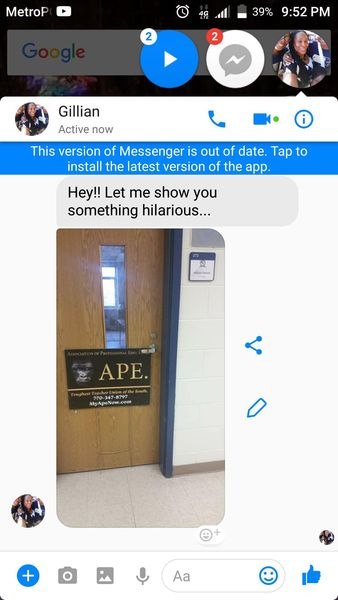
The politicians, policymakers, educrats, and superintendents don’t know what the heck is wrong with public education. They only know to blame the teachers. So, these educational bozos only know to immediately blame the teachers if the students aren’t learning. At A.P.E. we do not allow our members to be abused by this backward philosophy. Unlike GAE & PAGE, A.P.E. represents ONLY teachers NOT Administrators!
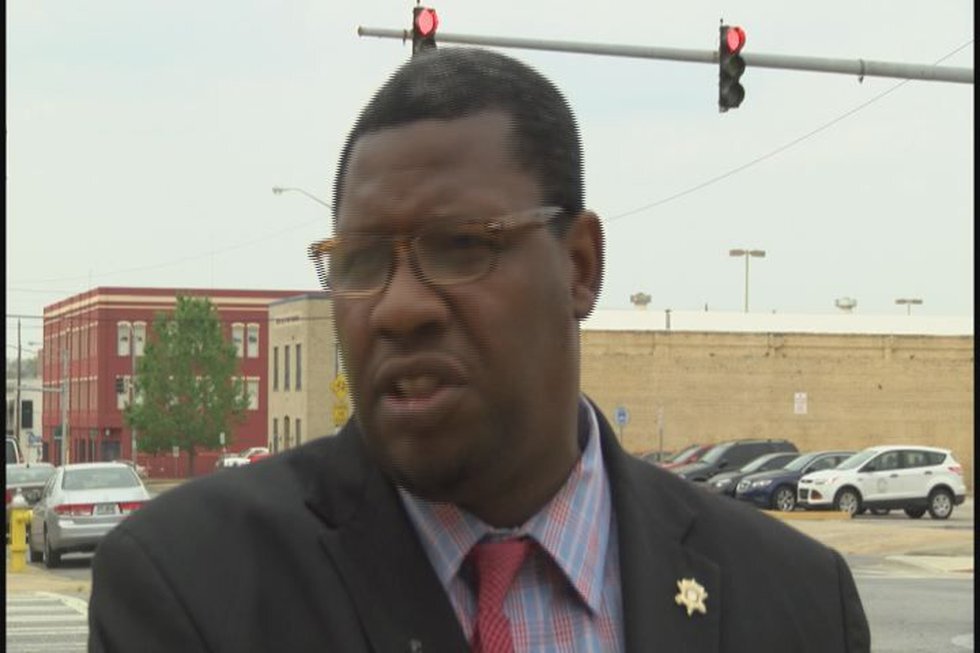 Protesting the Dougherty County School System, we are demanding the dismissal of a principal. In reference to this news article, I stated, “A principal believes he can speak down to this teacher and use a racial slur, based on what she has shared with me. We will not tolerate this.”
Protesting the Dougherty County School System, we are demanding the dismissal of a principal. In reference to this news article, I stated, “A principal believes he can speak down to this teacher and use a racial slur, based on what she has shared with me. We will not tolerate this.”Georgia Public School Administrators Should Support Classroom Teachers!
Norreese L. Haynes, BSBM, MSA
I often wonder why some Georgia school administrators genuinely support classroom teachers, while others seem to view it as a burden. The latter group pretends to back teachers but then undermines their careers behind their backs. These administrators smile in teachers’ faces while having their assistant principals do their dirty work. If the assistant principals refuse, the head administrator starts a paper trail to remove them. These deceptive leaders are “Masters at Conning Educators” (MACE).When teachers work tirelessly for these administrative “cons,” such leaders should show immense gratitude for the sacrifices and hard work of their staff. Georgia teachers are deeply passionate about their work, often starting their days as early as 4 a.m. and leaving as late as 8 p.m.
So why aren’t these “cons” appreciative? Over the years, I’ve learned that people who feel entitled often act in bad faith. These administrators fail to understand why teachers love their profession. Many of them have never demonstrated the level of dedication that most Georgia teachers embody.
One of my APE members once shared her story of working three jobs while pursuing her teaching degree. Despite wanting to give up many times, she persevered while raising two teenage children.
When you understand hard work and sacrifice, you make better decisions than those who feel entitled. You recognize that negative actions lead to negative consequences. Good principals consider the impact of non-renewing a teacher, while entitled ones only think of themselves, showing little regard for the repercussions on teachers who might lose their jobs or certifications.
Georgia teachers need to be aware of these “cons” and find protection within a strong and assertive organization like APE. Why APE? Because we don’t shy away from these administrative “cons”; we confront them legally. We believe negotiating with them is a waste of time, so we focus on taking strategic legal action against these administrators.
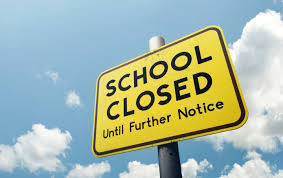 Georgia Teachers Rise Up!
Georgia Teachers Rise Up!Norreese L. Haynes BSBM, MSA
If you are sick and tired of being bullied by administrators and school superintendents, Georgia classroom teachers rise. I have made it one of my life goals to support classroom teachers in Georgia by starting the teacher's organization, the Association of Professional Educators (APE). APE always has and will always be a teacher's organization that will fight back aggressively against the power that be which is, "abusive school systems and their incompetent superintendents. APE fights when the other teacher's organization is afraid to why? Because these other teacher's organizations allow these same administrators to join their weak organization, they are scared to push back against these abusive administrators in fear of losing them as members. APE represents Only teachers, not administrators!
Now, let's talk about leadership. Leadership is leading, not following. Making teachers return to schools during a pandemic without a safe plan for returning is not leadership. These superintendents think leadership is getting paid a lot of money harassing teachers and supporting students misbehaving while kissing the butts of school board members. They have no real shame if they did; they would stand up against schools' reopening during a pandemic. They would tell the tr

 Like the great John Lewis, A.P.E. is always getting into good trouble—necessary trouble!
Like the great John Lewis, A.P.E. is always getting into good trouble—necessary trouble!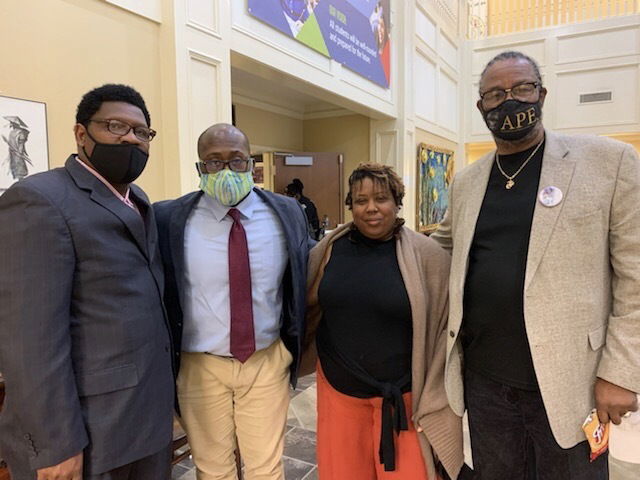 A.P.E. Attorney Jonathan Ross represents an A.P.E. member at a hearing.
A.P.E. Attorney Jonathan Ross represents an A.P.E. member at a hearing. The A.P.E. teachers’ organization is the only group actively working to protect Georgia teachers from COVID-19. A.P.E. will persist in our efforts to prevent the reopening of Georgia’s schools until it is safe. Teachers, join us in this fight.
The A.P.E. teachers’ organization is the only group actively working to protect Georgia teachers from COVID-19. A.P.E. will persist in our efforts to prevent the reopening of Georgia’s schools until it is safe. Teachers, join us in this fight.- The Double-Edged Sword of Being a Teacher During a Global Pandemic
Bobby L. Wilson, Founder & CEO of Metro Atlanta Urban Farm (MAUF)
When I think of teachers, I think of the role that they play in helping produce our national and
global leaders. It confounds the mind to realize that none of our leaders would be where they
are today without teachers. Now, as we are faced with a global pandemic, the very leaders
who have benefited and who are benefitting directly from the commitment and sacrifice of
teachers, are willing to put those very teachers’ lives at risk by forcing them to return to their
classrooms without the maximum protection possible against a deadly virus.
It was a teacher who pulled me aside as a middle school student and encouraged me to
straighten up, fly right, and think about my future. It was a teacher who put me in a car and
drove me to the college campus, a trip that completely changed the trajectory of my life. It was
a college professor (teacher) who encouraged me and showed me that I could do great things
with my life. I am who I am today because of the guidance that I first received from a teacher in
a small, rural town in Bay Springs, MS. Yes, I am an advocate for teachers.
During these unprecedented times of a global pandemic, the definition of “essential” or
frontline workers seems to change according to the will of whoever is in power. The double-
edged sword for teachers is that they are frontline workers when it is convenient because,
without them, schools cannot operate. Yet, when it comes to protecting this group of frontline
workers, the CDC and Georgia’s Governor Brian Kemp say that although teachers are essential
workers, there are not essential enough to receive the vaccine in round 1A unless, of course,
they are 65 years of age or older.
Within this current educational dilemma, teachers are being subjected to the greatest degree
of inequitable expectations. Teachers are experiencing in real time inequity even within local
school districts. The exposure of classroom teachers is far greater than it is for upper-level
employees—superintendents, principals, etc.—who are not required to share their workspace
with several other people, especially students. Teachers, by the very nature of their job, must
welcome any students, or as many, who opt for face-to-face instruction even though physical
classrooms are not designed to maintain the “required” six-foot of social distance and may not
have proper ventilation. - When the CDC decided that schools could reopen “safely”, they did so without soliciting input
from the people most impacted by their decision. Despite their most recent recommendations
suggesting that it is “safe” for teachers to return to the classroom, they offer no suggestions on
how to limit exposure to a deadly virus, especially in marginalized or underserved communities,
where districts cannot ensure proper safety measures are in place to protect them. Many
teachers are using their own resources to purchase classroom cleaning supplies. Teachers are
justifiably concerned about their own well-being because the CDC has no remedy for students
who refuse to wear their masks properly or who fail to report exposure. With all due respect to
our President, no place is completely safe from Covid-19 exposure and schools are less safe, not
more.
The recent situation in Elberton, GA that is still making headlines today is, in my opinion, unjust
and unjustified. An entire community is being denied additional vaccines because a decision
was made at the community level to vaccinate teachers. According to local leaders, this
decision was a move to prevent waste of a vaccine that is already in short support supply by
administering the doses to its “frontline” workers—teachers. Who is better equipped to make
decisions for the good of the local community other than its local leaders—the independent,
community-based organizations such as the clinic that was charged to administer the vaccines?
This example of the double-edged sword is that teachers are “essential” enough to be forced
back into schools with our nation’s children, but not essential enough to be protected from a
virus that puts their lives are at risk. With the more contagious Covid variant spreading rapidly
across the US, how does the government maintain that schools can reopen if they do so
“safely” without vaccinating the teachers? It is not the scientists, federal or state government
who have their finger on the pulse of local communities, but rather it is the local community
leaders themselves.
A national research project that focuses on justice, equity, and inclusion has shared strong data
to suggest that ICBOs are better equipped to make decisions for their communities. Afterall,
who knows the community better than the people who live in the community? Another
example of the double-edged sword is a matter of inequity as it relates to teachers being
included among essential workers. Vaccines are being administered to teachers, but only those
who quality as senior citizens anyway. If decision-makers and providers would listen to the
voices of the local communities, their procedure could be more equitable and there would have
less reason to punish local communities for doing what is in the best interest of the community.
As a former educator, current independent community-based organization, and designated
Covid-19 emergency relief center, I am deeply disheartened by what happened in Elberton, GA.
Instead of being praised for making a sound, local decision, the entire community is being
penalized because the Covid-19 agreement did not include the voice of the community. To add
insult to injury, it seems clear that the policy is more of an “I know what you need”, power and
privilege, more than it is about communities. The communication between policymakers and
this local community seems to have been unclear and poorly disseminated. Otherwise, why - move to raid the clinic rather than acknowledge inequity marginalized communities, and how
local leaders chose to work through those challenges by trying to save its teachers.
As a community-based organization, allow me to lend some ideas towards the solution.
President Biden has declared a national emergency. I would like to suggest first that teachers
be allowed to continue virtual instruction until all teachers can be vaccinated. Another option
is that the government could consider allocating funding to create mobile vaccination units to
help close the disparity gap between essential workers. These mobile units would be operated
by retired school nurses and supervising physicians and who would travel from school to school
within districts to administer the vaccine to its teachers. Mobile vaccine units would provide
teachers with the protection needed alleviate some of their greatest fears, frustrations,
anxieties, and concerns about not being treated equitably as essential workers.
The question of security and eliminating waste could be answered by school leaders who would
agree to provide the exact number of vaccines needed for their staff. The vaccines would be
shipped directly to the community’s medical facility who, in turn, would distribute to the
community-based organization that would supply the mobile units according to the information
received from the schools.
As the conversation continues and data continues to emerge on our response to Covid-19,
showing respect to our frontline workers—the teachers, is critical. Forcing schools to re-open
“safely” without vaccinating the teachers is only going to lead to more school closures and
educational delays. The double-edged sword cuts both ways A.P.E. in Newton County fighting back against teachers’ brutality.
A.P.E. in Newton County fighting back against teachers’ brutality.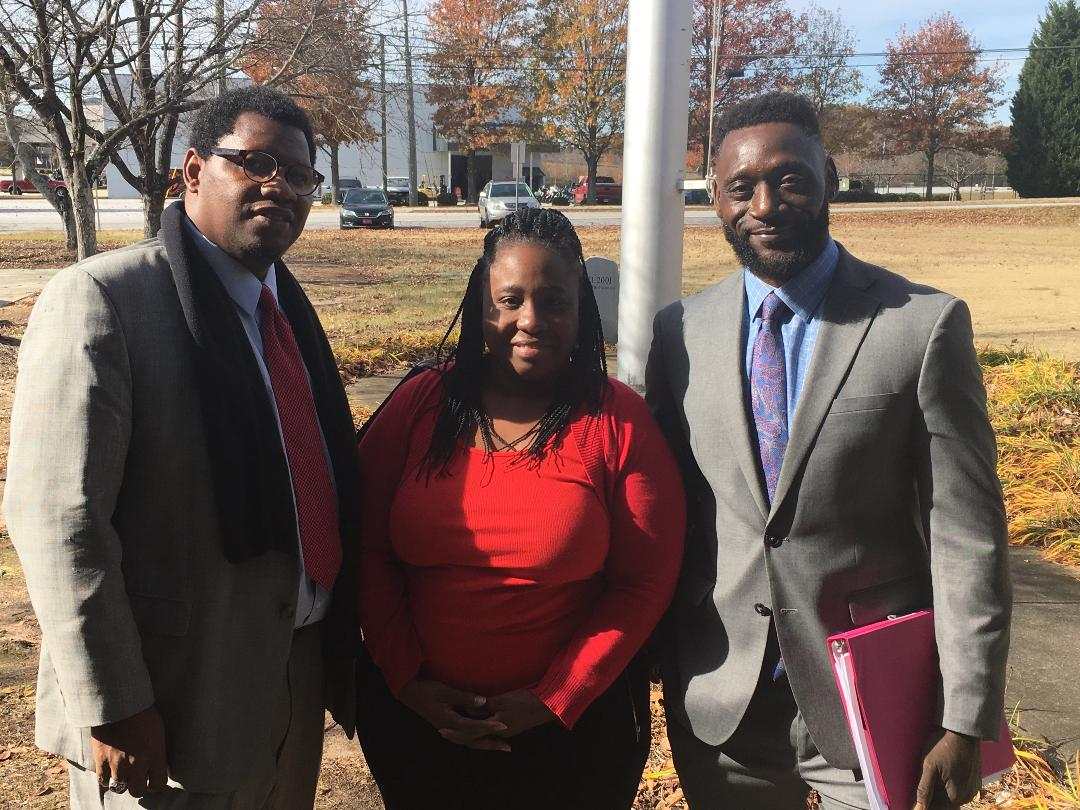 A.P.E. Chief Special Counsel Gabriel Daniels vigorously represents an A.P.E. member in a wrongful termination hearing. Another satisfied member!
A.P.E. Chief Special Counsel Gabriel Daniels vigorously represents an A.P.E. member in a wrongful termination hearing. Another satisfied member!
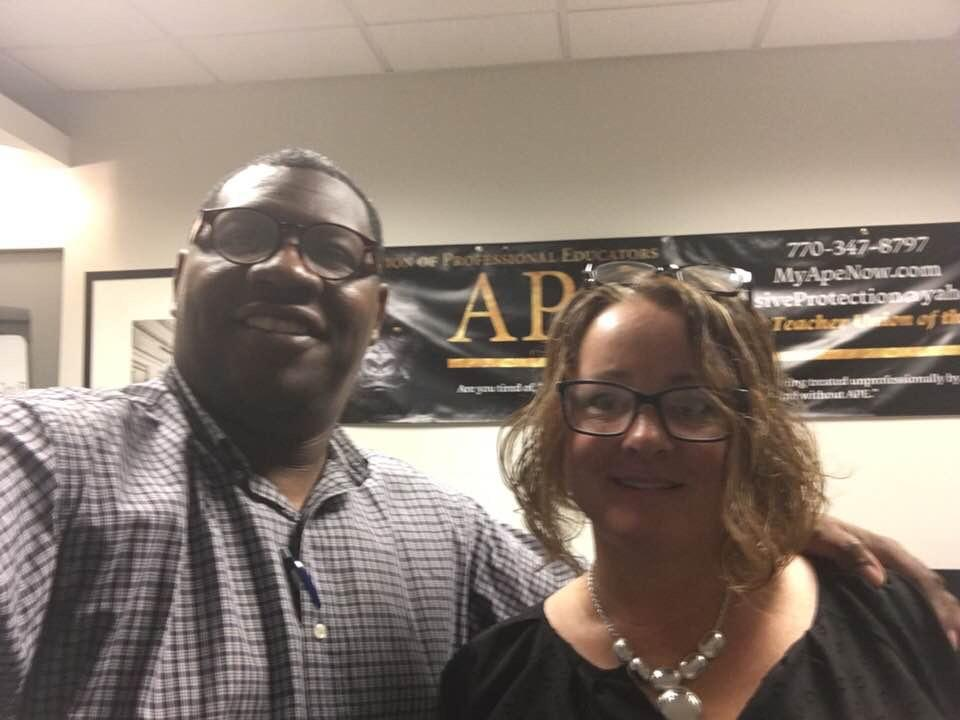 Ms. Karolyn Sutton, a new A.P.E. member in the Clayton County School System, is celebrating her victory!
Ms. Karolyn Sutton, a new A.P.E. member in the Clayton County School System, is celebrating her victory!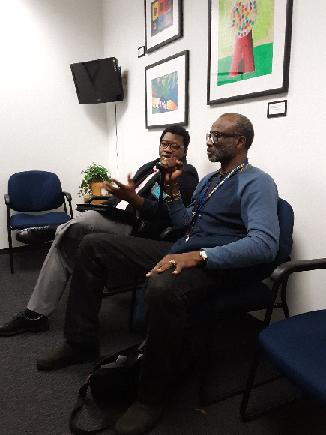 Strategizing with Mr. Danny Tukes at Atlanta Public School Central Office"
Strategizing with Mr. Danny Tukes at Atlanta Public School Central Office"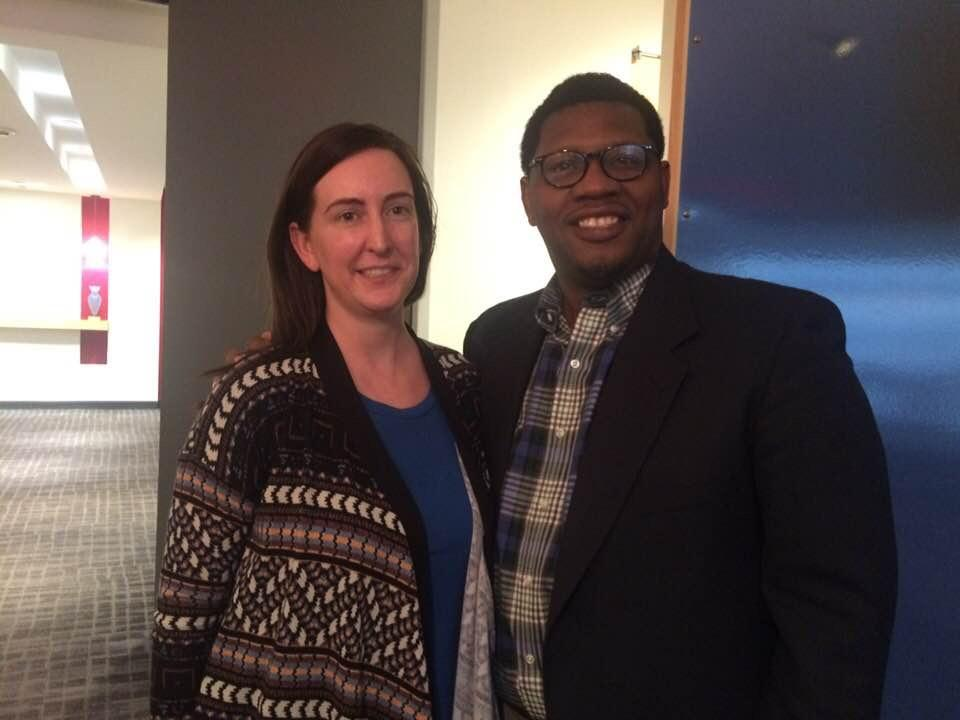 Ms. Cathy Gillespie, a new A.P.E. member in the Douglas County School System, is celebrating her victory!
Ms. Cathy Gillespie, a new A.P.E. member in the Douglas County School System, is celebrating her victory!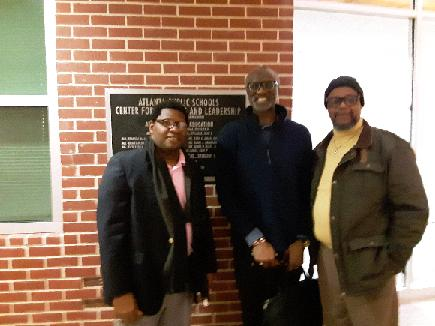 "Norreese Haynes, Dany Tukes, and Leroy Walker are celebrating a victory in their hearing!
"Norreese Haynes, Dany Tukes, and Leroy Walker are celebrating a victory in their hearing! "Ms. Loretta Keith, a new A.P.E. member in the Clayton County School System, is celebrating her victory!
"Ms. Loretta Keith, a new A.P.E. member in the Clayton County School System, is celebrating her victory! Norreese L. Haynes, BSBM, MSA
Norreese L. Haynes, BSBM, MSA In my book, Public Education: A Warehouse for Children, I explore how the public education system effectively warehouses children. The first step toward addressing this issue is to initiate a conversation about it, but that hasn’t happened. Why? Is there money in solving the problem, or is there more profit in warehousing children? Public schools operate similarly to corporate America, profiting from those who are invested in their offerings—only in this case, the “products” are children. Who benefits from public education? Those who profit from selling testing materials, textbooks, and consulting services aimed at convincing school systems to adopt their products. Their primary concern is not the well-being of the kids.
These consultants target public schools riddled with gangs and troubled students, believing that dysfunction can lead to a so-called “transformation.” The harsh truth is that they profit from urban school systems because they know these schools can be easily exploited, particularly due to challenges like a lack of parental involvement. Unscrupulous consultants persuade urban school leaders that they hold the keys to solving their problems, offering flashy ideas with hefty price tags. They are all too aware that the real issues stem from a lack of parental engagement, and let’s not forget, the code word for “urban” often translates to “Black school systems.”
Now, let’s address the elephant in the room: the issue with public education is that disruptive students often run the schools. Urban school leaders hesitate to expel these students because they come with a financial incentive. The state and federal government allocates around $22,000 per student, which rises to approximately $24,000 for those requiring special education. If teachers face pushback for removing disruptive students or sending too many to the office, it’s because administrators fear the financial repercussions. The average first-year teacher earns between $38,000 and $40,000 a year. If just two students are expelled, the school stands to lose about $48,000 annually. If three to five students are expelled, that figure could reach $120,000, putting the teacher’s job at risk. It’s far easier to dismiss a teacher than to deal with a disruptive student. This is why it’s crucial for teachers to be protected, as members of the Association of Professional Educators (APE). School systems fear APE more than disruptive students because APE poses a greater threat.
Running an urban school is not as challenging as it may seem. If I were the principal, my first step would be to establish order. The universe operates in order, so why shouldn’t our schools? I would make it clear to all disruptive students that my support lies with the teachers. Any tears or complaints from students would be futile. Lastly, there would be no free passes. If a teacher writes a student up, action would be taken. If a student refuses to leave the classroom, I would personally intervene, ensuring they are removed and escorted out in a manner that sends a message to others. Consistency in this approach would quickly establish a culture where students understand that they are there to learn—or they can leave.
When urban school superintendents and principals embrace this philosophy of order, we will see genuine change in public education. It’s amusing that some administrators believe a poor curriculum is the root cause of student disengagement. The curriculum isn’t the problem; establishing discipline is key to teaching effectively. Teachers are dedicated professionals who know how to educate; they simply need support from their administrators. If administrators honor and respect their teachers, they will foster a committed and hardworking staff. If not, they should be prepared for APE to take action.
AN EXPLORATION INTO THE FACTORS INFLUENCING TEACHERS' JOB SATISFACTION IN PUBLIC SCHOOLS:
A Case of Georgia Public School Teachers
Norreese L. Haynes
(Master Thesis 2017)
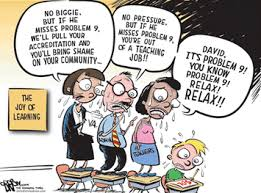
In 2015, the Georgia’s Department of Education in its research revealed that Georgia has a record of more than 100,000 teachers with the annual turnover rate of over 10%. Year, 25 percent to 30 percent of Georgia’s new teacher employment emanated from former teachers who have “had a break” from teaching for a period. The objective of this research is to know if teachers’ job satisfaction can result in a decreased in their turnover rates.
The literature review supports this assertion explaining theories backing up teacher’s job satisfaction and turnover rates. Also, diverse research was done on job satisfaction and its variables, such as pay and benefits, staff support, training and development, recognition, teachers’ evaluation, etc. And how it affects diverse factors was shown.
To determine how job satisfaction impacts turnover rates, 40 Georgia teachers were surveyed on various issues as it impacts their job satisfaction. The result reveals that although lots of the teachers have looked for alternative teaching profession within the last few months/year and a handful of the teachers have also looked for a new job outside of the teaching profession in the past one year; job satisfaction will reduce the high turnover rates among Georgia teachers. With regards to the study’s hypothesis, the result revealed that for Georgia teachers, pay and compensation do not influence their job satisfaction.
With this result, all stakeholders within the Georgia region had been encouraged with practical key action points that can gradually but certainly reduce the high turnover rates experienced within that region.
Chapter II
Literature Review
Introduction
Job satisfaction is a very important factor that has ripple effects on the so many areas and stakeholders within the public school system. Obtaining and retaining quality teachers is a continuing concern that is facing educational leaders at all levels.
What Is Job Satisfaction?
The term Job satisfaction does not have a universally accepted definition (Demirtas, 2010). Job satisfaction can be described as an increased state emotionally due to the appreciation of one’s job experience (Demirtas, 2010). To improve teaching qualities and the high rate of teacher’ turnover, it is very crucial to sustain and ensure teachers’ high job satisfaction. (GU, 2016). Job satisfaction is the degree to which individuals feel positively or negatively about their jobs (Song & Alpaslan, 2015) Job satisfaction is seen as an individual’s attitudes and feeling toward his/her profession (Sunal, Sunal, & Yasin, 2011). A teacher’s job satisfaction comprises of content with the profession and content with the work environment. (OECD, 2014)
 Importance of Teachers Job Satisfaction
Importance of Teachers Job SatisfactionHigh job satisfaction enables teachers to deliver quality teaching, and this makes their students more successful (Demirtas, 2010). Teachers’ job satisfaction impacts student achievement (Ronfeldt, Loeb & Wyckoff, 2013). Students experiencing high teacher turnover score lower on standardized assessments (Ronfeldt, Loeb & Wyckoff, 2013) Job satisfaction are closely tied to teacher turnover (Green, 2014). Job discontentment and turnover have a negative impact on students’ ability to learn and their teachers’ work settings (Ronfeldt, et al., 2013). The evolution and preservation of social capital are distorted, including staff companionship, community, and credence (Ronfeldt, et al., 2013; Van Maele, Van Houtte, 2011)
Job dissatisfaction and turnover impact all students. With increased teacher turnover, students experience low score on standardized assessment. The effect of a teacher’s satisfaction and also attrition can include, but not restricted to dissatisfied teacher’s students who also affects the students negatively (Ronfeldt, et al., 2013).
Teachers Job Satisfaction in Public Schools
In the area of education, many studies on teacher’s job satisfaction have been carried out (Demirtas, 2010) Research has revealed that an increased job satisfaction will result in a decrease of teacher turnover (Ingersoll, 2011). It was also discussed that increased job satisfaction for teachers could result in increased enjoyment and motivation for both schools and students, which leads to student success (Demirtas, 2010).
Based on empirical research and counsel of researchers, district leadership and school, The National Policy Board for Educational Administration (2015) identified ten standards that explain educational leadership. This includes assisting and developing the curriculum of the school, maintain teachers that are effective, dedication to the school’s mission and vision, sustaining a wholesome school environment, supporting the teacher’s development professionally, authorize teachers to perform and supervise staff resources effectively (As Cited in Burk Hauser, 2016).
Duyar et al., (2013), discovered that the curriculum, managing, teacher’s supervision and also support provision, Teacher’s priority was connected to the growth of job satisfaction. 2.5 Teaching

Profession in Georgia
The recent cut cost budget strategy by the state has affected the k-12 education. Based on the research for the Center on Budget and Policy Priorities. Johnson et al. (2011) reveal that the depletion of education funds has resorted the school board to look for ways of reducing spending and still provide a good education for all students ( as cited in Mayer, Wiley, Wiley, Dees, & Raiford, 2016). To buttress the point, Cara Moore (2012), explained that “A once upon a time predictable and stable career have all of a sudden turned strained and tentative due to changing demands, and a higher reason to improve outcomes.”
Teaching is a career for those that can adjust to the changes and who can show these changes to the society. Teaching is for individuals who continually renew themselves, who are yearning for research, productive, creative, and responsive, who is advancing in its communication skills, and who have a positive state of mind towards the profession (Tok, 2013). Over the past five years, the report showed that newly employed teachers in Georgia leave the workforce within their first five years of teaching at a percentage of 15%. The Data also revealed that over 40% of newly employed teachers in Georgia, where out of the teaching job in 2015. Depreciation of Georgia’s teachers (High School) was the highest in the midst of all other subgroups in 2014 (Stephens, Hall, & McCampbell, 2015)
According to the Georgia Professional Standards Commission statistics (2015), reveals that 44 percent of public school teachers in the state resign in their initial five years of work. With regards this statistic, the findings of a Georgia Department of Education survey shows that 2 out of the three respondents reveals that they are unlikely or very unlikely to encourage teaching as a career to a prospective high school graduate. Teacher Remuneration and rank is little in Georgia (Smith & Persson, 2016) Teacher salaries are thrice below the coveted standards reported by teachers (Ingvarson et al., 2013). However, notwithstanding the low remuneration, teacher turnover is yet low (Public Policy Research and Training Center, 2014). This is possibly as a result of the overall increasing teacher’s unemployment rate, which prevents the teachers from taking the risk that they can get another job. Keeping up qualified and viable teachers is a key calculate the effective science education of secondary school understudies (Ronfeldt, 2012)
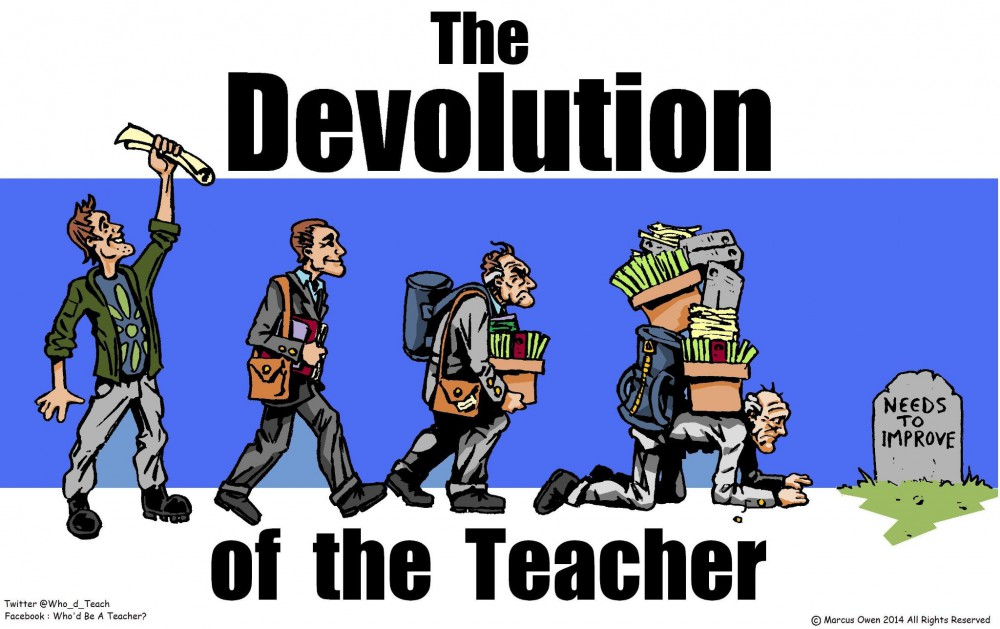
Measurement of Job Satisfaction
Job Satisfaction and Salary, Benefits, and Reward
All jobs and professions give a form of remuneration and rewards to individuals under them as a form of compensation for the time, knowledge and their expertise that made use of. The influence of salary, benefits, and rewards cannot be over-emphasized.
Research has shown that the salary of the first year has a distinct influence on a teacher retention. It was discovered that almost all new teachers that are (97%) having a salary of forty thousand dollars or more are more likely to come back to teach in the second year in comparison with 87% who earns less than forty thousand dollars ( Gray & Taie, 2015).
Akali (2010), in his research, concluded that the components that affect the job satisfaction and performance of teachers consist of Pay, recognition, promotion, and the condition if work
Job Satisfaction and teacher’s performance
The performance of the teacher anchors on the characteristics of the teacher, which comprises of: Features of the students (Opportunities for learning, and academic activities), teaching factors involved (This includes Lesson structures and communication skills), aspects of learning, Knowledge base and the classroom. (As cited in Chamundeswari, 2013, P 2). Indhumathi (2011), revealed that there was an association between performance and job satisfaction. (As cited in Chamundeswari, 2013). A research work carried out by (Usop, Langguyuan-Kadtong, Askandar, Usop, & Annierah Maulana Usop, 2013) on the relationship between job satisfaction and work performance in Philistines using a sample size of 200 public school teachers. The result reveals a satisfying relationship between job satisfaction and work performance
Job satisfaction and job retention
According to Spear, Gould, & Lee, (2000), the framework of policies are constructed to expand retention is as a result of the assumption that teachers will remain in the teaching profession if there is satisfaction in their job as well as associated conditions.(as Cited in Usop, Langguyuan-Kadtong, Askandar, Usop, & Annierah Maulana Usop, 2013).
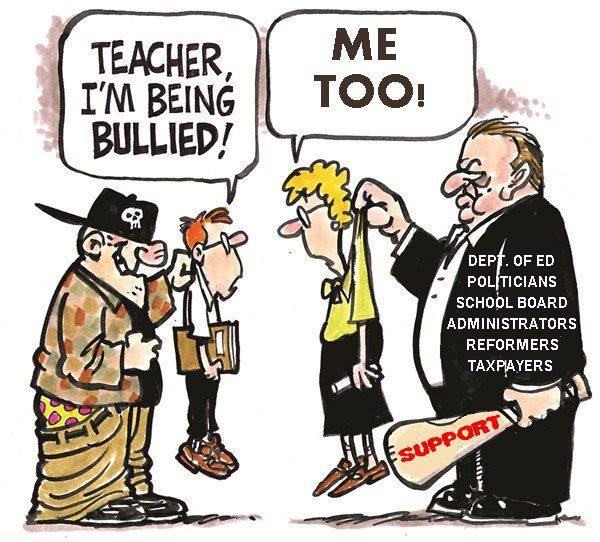 Job satisfaction and school Support
Job satisfaction and school SupportAccording to Richard Ingersoll (2013), most teachers tend to leave their teaching profession because of poor admin support, dilapidated work conditions, poor salaries and absence of the ability of teachers to influence school decisions ( as cited in Barth, Dillion, HUll, & Higins, 2016). When a teacher's sense a poor support for their work, there is no motivation to do their very best in the classroom. Also, when the teachers are not contented with the working conditions, there is a probability of them is changing schools or totally leave the teaching profession Akhtar, S. N., Hashmi, M. A., & Naqvi, S. I. H. (2010).
Leadership in schools is a very important factor in teacher retention. An effective principal establishes and encourages professional collaboration and continuous improvement. (Barth, et al., 2016). According to Bogler and Nir, (2012), when the management of a school notices and rewards teachers, then they become committed. Also, due to this, there would be a need in them to upgrade their performance and this leads to job satisfaction (cited in El-Hilali. &Al-Rashidi, 2015)
Job satisfaction and Parent involvement /Satisfaction
Isaiah (2013), was of the opinion that involvement in school gives the parent a chance to watch and monitor school activities. This will enable parents to be corporate with teachers in the completion of school tasks and assignments. With regards to the students, with their parent’s involvement, there are fewer behavior issues, better grades and increased academic pursuits in comparison with students with less parental involvement. Also, he argued that the involvement of parents plays an important role in learning and teaching which is seen as a determining factor in teacher’s satisfaction. He was also of the view that synergy between teachers and parents is increased with parental involvement ( El-Hilali.&Al-Rashidi, 2015)
Kimiya (2011), was of the opinion that Involvement of parent is linked to increased achievement of their children in mathematics and language, enrollment in the more tasking academic program, increased academic persistence, good behaviors, good attendance and decreased dropout rates. (As cited in Mbogo, 2015). Parent participation can include phone and written communications, school function attendance, volunteering service by parents, attending parent/teacher conference, assistance with homework’s, involvement of the parent in decision making, etc. (Mbogo, 2015)
Job Satisfaction and Teachers' involvement in decision making
Mentoring and collaboration of teachers can strengthen social supports and collegial relationships that build positive work environment and adds to job satisfaction (Burns, Darling-Hammond, 2014). Included is the fact that teachers who engage in leadership roles and perceived that their input in school decision making is appreciated have better job satisfaction than the others perceived that they are voiceless and isolated.
Reduced or hindered teachers’ involvement in decision-making, and poor working conditions are one of the most common reasons for teachers turn over. Job satisfaction of teachers which is associated with the Teachers' work performance includes; a teachers’ commitment, motivation, and involvement in the job (Burns, Darling-Hammond, 2014)
Job satisfaction and Colleagues
Interrelationship between teachers and their colleagues can either bring about job satisfaction and job dissatisfaction. For example, in a research work carried out by Thekedam (2010), in which instruments such as working conditions, supervision, colleagues, pay, the job, promotion, security are used as determinants of job satisfaction and dissatisfaction, the result reveals that working condition was ranked high for satisfaction. Mustapha, (2013), also carried out a research on job satisfaction which was measured via interpersonal relationship and work load. The result revealed a positive association between interpersonal relationship and job satisfaction (cited in Nizam & Adil, 2014). According to Akhtar et all. (2010) job satisfaction level can be affected by both intrinsic and extrinsic motivational factors, supervision, quality, Workgroup interpersonal relationships and the extent of success and failure on the job.
Job satisfaction and Nature of Work /working conditions
According to Josanov-Vrgovic & Pavlovich (2014), the most regular component of a teachers job satisfaction includes working conditions, teachers' behaviors, students' development, autonomy of teachers, schools culture and climate and teacher interaction with students
Chang, & Kim (2011), also observed that working conditions have emerged as the main source of teacher job dissatisfaction and teacher turnover. (As cited in OECD, 2014). Chandrasekar (2011) reveals that institutions need to be observant to develop a work environment that will develop the employee’s ability to be more prolific so has to increase the profitability of the institution. He was also of the opinion that interpersonal relationships play an important place in job satisfaction (As Cited in Raziqa & Maulabakhsh, 2015).
In a research work carried out by Raziqa & Maulabakhsh, (2015), on how the working environment impacts job satisfaction, using a simple random sampling in collecting data from over 200 employees in Pakistan, a positive relation was discovered between working environment and satisfaction in the job. Bakoti´c and Babi´c (2013) while analyzing the association between job satisfaction and a teacher working conditions through the use of quantitative technique using work conditions, salaries as variables. The result reveals that those who work under poor working conditions have their total job satisfaction hampered (As Cited in
Job satisfaction and Stress
Research reveals the 51% of the teacher go through lots of stress several times a week. Teachers in grade school experience stress more within a week in comparison with middle school teachers or high school teachers (59 percent vs 44 percent vs 42 percent). Tehseen & Hadi, (2015), Teachers experience an increased stress level due to higher demand. This result in a potential of being dissatisfied with their job (Moore, 2012). Ferguson, Frost, Hall, 2012; Green (2014), were of the opinion that gloomy work stress can result in anxiety and depression and is connected with poor job satisfaction. The combination of depression, stress and anxiety are a negative result of job satisfaction as (cited in Smith, 2016). Moore, (2012), reveals that teachers experience an increased level of stress due to pressure and demands. Occupational related stress with a need to improve student grade positions the teacher at a risk of job dissatisfaction.
Antoniou, Ploumpi, Ntalla, et al., (2013), inquire into the degree of stress and burn-out in teachers and their ability to cope with it. It was revealed that primary school teachers experience an increased stress level in comparison with secondary school teachers (As cited in Nizam & Adil,
A synopsis from my 150-page thesis. We want every teacher who visits our website to know that APE knows the issues.
No! You Cannot ‘ape’, A.P.E.! If We Are Correct In Our Analysis, You Should Have Already Joined.
Norreese L. Haynes, BSBM, MSA
Case 1.
It’s obvious that Georgia teachers are treated unfairly. When animals run the zoo, there’s bound to be problems. It doesn’t surprise me: when students act out in class, administrators blame the teacher, like they somehow control their students through hypnosis. I say that’s hogwash. Parents should hand over their kids’ birth certificates, and stop wasting money on babysitters because, look! We have all of those things in one person! The teacher plays mommy, daddy, good cop, and bad cop. When teachers discipline, like mommy and daddy should, suddenly the teacher’s the villain.
What happens next? Kids lie. They go to the front office, and now administrators are investigating everybody that dared do something constructive with the kids. They’re afraid of losing their jobs, and facing repercussions from the parents. Lazy superintendents fear the school board and school board members fear Election Day. But animals fear no one. Teachers face non-renewal and all because some kid told a lie, and the adults responsible for filtering out the fakes believe them. They destroy your career in the process.
Case 2.
Teacher dresses better than the administrator. The administrator non-renews teacher because they’re too lazy to dress up. The teacher holds a higher degree than them, communicates better with parents and staff, and even the janitor. A black administrator might get mad because the teacher didn’t pledge to be a member of their sorority or fraternity. This is crazy, and most of the time, non-renewal happens because of something personal, not a profession-based. Administrators kissed a lot of ass to get to their seat, and they want you to do the same. You won’t. You have the respect. You worked hard to achieve your degree and certification, but people fear the power they see in others that they don’t see in themselves. The plot is set to destroy your career and get you fired.
Case 3.
Teacher joins a lazy ass teachers’ union instead of a real teachers’ union like the Association of Professional Educators (APE). Those other unions take money from good educators and then do nothing for them. When teachers get in real trouble, they cry out and there’s no help, even after paying into these unions for years. Why would you join a union that allows administrators in their union? So in reality, you cannot out ‘ape’, APE. APE will destroy any administrator who tries to abuse its members and if you are a member, you have nothing to worry about; APE has your back. It's not about color, these lazy ass administrators will destroy any teacher who doesn’t kiss their ass. They are bipolar: they like you one day and hate you the next. Don't allow these bipolar administrators to destroy your teaching career; fight back and join APE today.
Case 4.
Lazy ass administrators abuses their power by using the evaluation process to destroy a teacher's career. A.P.E. calls this “Bad drive-by evaluations”. They come into your room unannounced, evaluate you when they are not scheduled to, and mark you low in communication. They mark you low in communication when even they cannot communicate. This area is used mostly because the administrator can be subjective. These administrators wait until it's time to give you your summative, end of year review so they can mark you down as negative for the year. This negative summative is recorded at the Georgia Professional Standard Commission (PSC) and if you have received two of these negative summative reports within 5 years, then the PSC suspends your certificate until you have had a chance to re-mediate your deficiency, but how can you re-mediate if you do not have a certificate to get another teacher position?
IF you have car insurance, you need teacher's insurance. Join APE today before you get HIT!
A Local Georgia Teachers Union Speaks Out!
Norreese L. Haynes, BSBM, MSA
Georgia teachers have been treated like shit for years. It is very sad for me to sit here and write about our great teachers without telling the truth about how some administrators treat them. First understand, that teachers love teaching, but when they face school administrators treating them like unwanted trash each day, preparing to teach every morning gets harder. How can a teacher teach when they are harassed every day by their administrators? At the Georgia teachers’ union where I work, The Association of Professional Educators (APE), we fight to destroy these administrators because we believe they are evil. The A.P.E. teachers’ union understands why teachers leave their profession. It’s not all about the money.
In my opinion, teachers stress from the lack of support from their administrators. They feel as if the administrator is more preoccupied with false testing instead of providing quality education to students. The A.P..E teachers’ union speaks out against the false priesthood of testing. We believe over-testing students is evidence of companies making money on testing material. These companies pimp school systems by telling them this is the new standard, or that this will help prepare students for the corporate world of technology. This is hogwash! Students need to know their timetables, the presidents, and skills to become productive citizens of society. Teachers know what students need best because they are the ones in the battle field of education each day. A.P.E. is an aggressive Georgia teachers’ union fighting back against these plantation tactics on Georgia teachers.
The APE teachers’ union knows some teachers waste their money on lazy ass unions in Georgia. They don’t aggressively protect teacher rights, but the A.P.E. teachers’ union will destroy any administrator who abuses its members. The A.P.E. teachers' union in Georgia is the most aggressive teachers' union in Georgia. If I was a teacher in Georgia, I would be an APE member. The A.P.E. teachers’ union saved so many teachers’ careers, I lost count. I started this union because I know teachers' are tired of being treated like shit, and are looking for an aggressive teachers’ union to fight back against abuse, and provide the peace of mind they deserve. I knew APE would be unstoppable when we first organized because I decided to do my best to destroy any administrator who attacked my members.
A.P.E. establishes balance in the Georgia teachers’ universe. We are the force that maintains order within the school system throughout Georgia. We are the forces that maintain order within school systems throughout Georgia. We will work with any school system willing to support the rights of Georgia teachers. We destroy any systems working against the welfare of Georgia teachers. Are we aggressive? You’re damn right! A.P.E. fears no one. People who abuse our members should fear A.P.E.
Now, let’s talk a little bit about these fake, ‘I-will-save-your-school-system’ superintendents. These superintendents do not have a shoe-fits-all approach or a magic pill to raise test scores. They just look to raise their salary so they can retire with a little more in their pocket. I’m sure some of them mean well, but to be clear, there is no magic pill to raise the test scores. Just ask Atlanta Public Schools (APS), the worst cheating scandal in history. Just google, “Atlanta Public Schools Cheating Scandal”.
Superintendents are recycled. They go from one school system to the next preaching the same shit: I am for children”. If they are for the children, why do they leave from the district that pays the most, and preach the same shit? I have said it for more than 18 years: raising test scores takes order in the school, discipline, and support for teachers. If a superintendent is not willing to call out slovenly parents, and throw the thugs out of the schools, test scores will always stay low.
 Administrators, the watchful eyes of A.P.E. are upon you!
Administrators, the watchful eyes of A.P.E. are upon you!“You’ll never find peace of mind without A.P.E.”
— Norreese L. Haynes, BSBM, MSA
What Can A.P.E. Do For You?
- Aggressive Representation When You Need It
- Evaluations of Administrators
- Street Pickets In Front of School or Central Office
- School Visits
- Grievances* Tribunals*Letters* Rebuttals*Hearings



